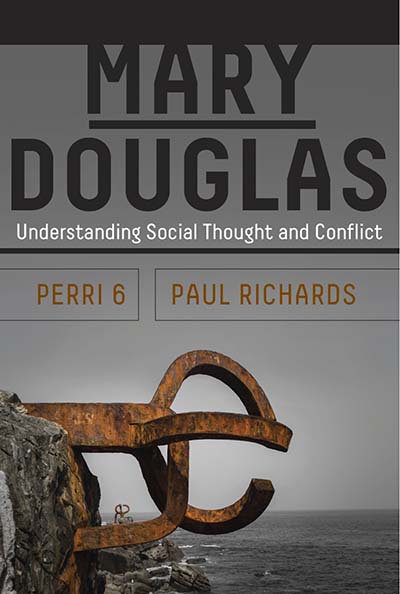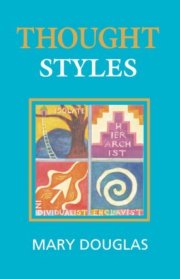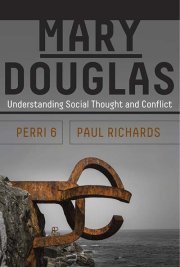Mary Douglas 1 – reading over three decades

In my late twenties my reading moved to include more non-fiction. By my forties there was very little fiction, even if this is still more than most people read… I read a lot.
So before my third decade I would wander the State Library of Tasmania’s reference section and browse and sit and read. Soon I would be expecting babies and made deliberate efforts to wander the shelves a few more times before it became difficult to do so.
Tomorrow my eldest graduates, and I can return to the books I read some decades ago. Or at least update my working knowledge of the field.
One of these books was:
Mary Douglas. Thought Styles: Critical Essays on Good Taste. London: SAGE publications, 1996.

And I have updated it by reading (but not by going to the library but by buying it):
Perri 6, and Paul Richards. Mary Douglas: Understanding Social Thought and Conflict. New York, NY: Berghahn Books, 2017. (link to publishers listing – I agree with the reviews listed there)

While waiting for that to arrive I also read:
Robert Wuthnow, James Davison Hunter, Albert Bergesen & Edith Kurzweil. Cultural Analysis : The Work of Peter L. Berger, Mary Douglas, Michel Foucault, and Jürgen Habermas. Reprint. London: Routledge & Kegan Paul, 1986.

Wherein I discovered so much of my ‘cultural marxist’ ‘elitist’ worldview that cultural warriors Russian stooges hate so much, that everything not man-o-sphere looks to them to be politicaly correct or as they now say woke (oh, the incompetence! The hate! The cat spray boundary marking they do in the noyau!) was actually develop by a pro-market Lutheran pastor… see reaction part 1 to Peter L. Berger : meaning is a lazy ritual (substack) and reaction part 2 to Peter L. Berger (substack). (I may never write on Foucault or Habermas).
I am putting that preamble because this is not so much a reaction as a way of situating my reading and updating via Mary Douglas: Understanding Social Thought and Conflict. This is appropriate because this book is an intellectual biography and follows Mary Douglas on her intellectual development. Which I did not do so at the time these early books where published (1986 – I was on the dole post dropping out, and late 1990s _ was heading into babyland post start-up in a waste reduction co-op). Basically I am an ill-educated, by which I mean badly-practiced, social theorist, which I recently labelled as a type of moral philosophy in starting to blog — I have my doubts about that. But today I pick up the label social theorist with glee— it means I have done no fieldwork, anthropologically speaking outside of dealing with trolls on the internet, and little to none social research that is not qualitative— as I’ve no data to add. Thus I am close to that LLM-like model collapse known to us as metaphysics. My only education is a Master of Social Ecology wherein I learnt, as a side dish, how complexity and chaos theory had taken over systems theory and cybernetics.
All that time however I was haunted by a conversation in a Melbourne squat and share house I crashed in one night in the 80s. Described here.
A turning point intellectual speaking was reading random books in a library as mentioned above. Thought Styles was one. I deal with another in an early post substack post (self hosted version).
Soooo… —I’ve been putting off dealing with Mary Douglas for some two years.
This is the first of a series. It positions my reading, and introduces what I find useful in Mary Douglas efforts, as follows:
Provides a useful testable description of the world, by outlining a nested necker cubed set of agencies/practices and their outsourcing from each our individual natures, which we live as the self in the world as we arise in evolution and deal and all negotiate around risk in insurance, hygiene and orderliness. That we Janus dance over the gaps, the incompleteness the aporia, the anomalous such order will always generate, or at least ground to its figure of action, where and when the world’s ongoing search for stability leads to change for good or ill. That the argy-bargy is a feature not a bug, and any worlding that seeks to irradicate argy-barginess is bad worlding.
That’s in my terms avoiding the terms I find irksome, like: ritual, belief, culture, religion, morality and others. Each dislike could be a book of rejections. I’ll try to put a lot of them in a post after I outline Mary Douglas’ framework in more acceptable terms than my idiosyncratic poetry above, even if its the poetry that is the reason I write.
My own terms are such that some often wonder, if jokingly, if I am schizoid (or innerworlded as I might put it as opposed to outerworlded like most of us). Now there is a pattern here, but it is one of failure to outerworld rather than successful innerworlding. (‘So highly internalised as to esoteric’ as one publisher’s reader wrote on an submitted manuscript of an early experimental novel of mine 'inside outback'). But if I was truly schizoid I wouldn’t be so driven to explain myself and seek publication.
(Crossposted at substack, you can comment there)
This is part 1 of a series on Reading Mary Douglas. Part 2 Mary Douglas: a negative gist is next.
